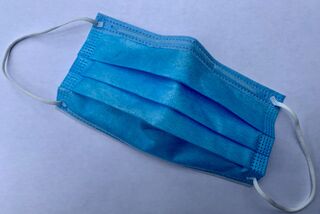Coronavirus Disease 2019
Wearing Face Masks "Means" Only What We Want It to Mean
What if it means we are protecting our freedom, not denying it?
Posted June 24, 2020 Reviewed by Gary Drevitch

Resilience has so much to do with what we tell ourselves in our own minds that our suffering and trauma “means.” Things can take on greater or lesser importance depending on what we let them mean to us. By redefining them, we can give them more or less power over us and determine their place and priority in our personal story.
Every time I hear someone complain about wearing a mask because it intrudes on their “freedom,” I think: You need to redefine what that mask means to you.
Public health experts tell us to wear a mask in public places with others not of our own household in order to prevent us, should we happen to have the coronavirus, from infecting others. I think it’s a safe bet to say that most of us who wear masks also do so expecting that they will protect us as well.
So what if, instead of thinking that a mask “means” someone is encroaching on my personal freedom, a mask only means that I am—we are—human? What if all it means is that we live in a dangerous, unpredictable physical world, and that wearing a mask around others during a deadly respiratory virus pandemic actually protects our freedom?
How? Well, obviously there is no freedom in being intubated and kept alive on a ventilator. Short of that, no one feels very free when even a mild illness lays them up at home for a few days.
What if we let the mask “mean” something positive rather than assigning negative associations to it? What if we let it mean that we are responsible citizens who care about our own and others’ health? How does that conflict with the freedom we Americans prize so dearly?
This is precisely how I have regarded mask-wearing. I haven’t let it mean something negative—repression, the government’s heavy hand, or even a talisman against fear. I don’t find it arduous to slip on my mask before I slide into a grocery store or other public space where social distancing isn’t possible, and remove it when I go back outside.
I learned as a young gay man living in a hard-hit city during the frightening early years of the HIV-AIDS pandemic in the 1980s that was possible to follow recommended safety precautions, enjoy a healthy sex life—even when the deadly sexually transmitted virus was potentially as close as the warm body next to mine, and not be paralyzed by fear.
Back then, condoms were to HIV-AIDS what face masks today are to COVID-19. Public health experts advised everyone on specific ways to avoid HIV if we were HIV-negative or to avoid spreading it to someone else if we had the virus. Condoms were (still are, in fact) recommended for use during the sexual activities with the highest risk, specifically anal and vaginal intercourse. Beyond engaging in those acts without protection, imaginations were free to create sexually satisfying experiences.
Men in general have never liked condoms, and gay men who had never needed them to prevent pregnancy found ourselves needing to get used to something that truly was disruptive at the most awkward moments. Some men regarded condoms as a kind of homophobic “punishment” for being gay.
But others of us attached a very different meaning to condoms. Instead of seeing them as encroaching on our freedom to have unprotected sex, we saw them as actually liberating us to enjoy intimacy and pleasure without the fear and risk that we might contract or transmit a deadly virus.
HIV is a far more lethal microbe than the coronavirus. Yet even in the scariest years, when there was no effective treatment and gay men were becoming ill and dying all around us in major cities, many of us still enjoyed satisfying sex lives by adapting to the new demands of the situation. We didn't allow a condom to “mean” anything more than mutual respect between partners and a sense of responsibility to the community not to contribute to the increasing toll of illness and death.
I have been joking that if we could get gay men to use condoms by defining them in terms of mutual respect and community solidarity, then surely those who see face masks as unacceptable encroachments on their personal freedom can learn instead to redefine them as both an implement and symbol of their freedom.
Wearing face masks in the COVID-19 pandemic is not “about” limiting anyone’s freedom. In the most fundamental sense, it’s about protecting and preserving our most fundamental freedom—the freedom to continue living. Why not define it in these positive, affirming terms instead of letting it "mean" something negative?
We can choose to frame our "story" about mask-wearing as a tale of our ability to adapt and stay resilient in the face of a frightening public health crisis—or we can tell that story as one of our victimization, by the virus, by the government or simply by the unfairness of life. Only the first approach is about freedom.




